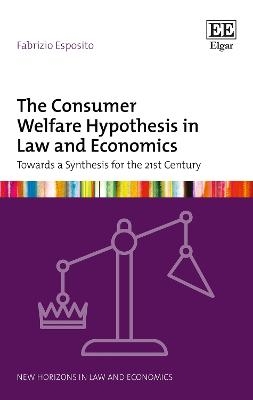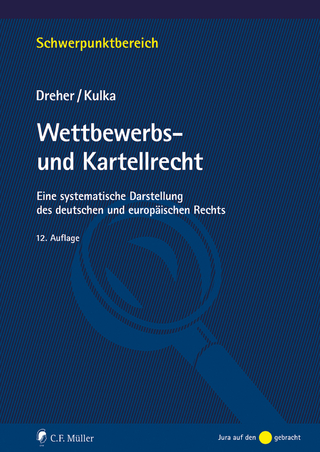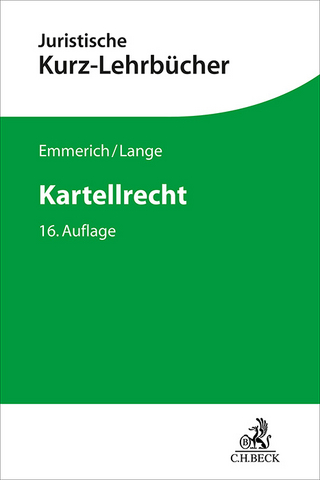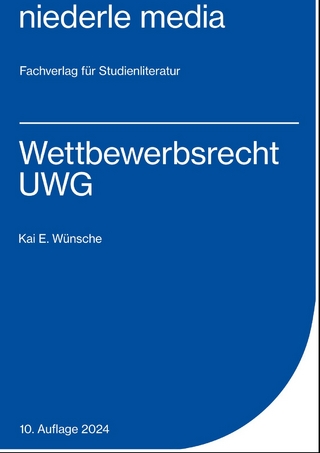
The Consumer Welfare Hypothesis in Law and Economics
Towards a Synthesis for the 21st Century
Seiten
2022
Edward Elgar Publishing Ltd (Verlag)
978-1-80037-964-0 (ISBN)
Edward Elgar Publishing Ltd (Verlag)
978-1-80037-964-0 (ISBN)
The Consumer Welfare Hypothesis in Law and Economics is a compelling account of market relations with firm roots in economic theory and legal practice. This incisive book challenges the mainstream view that allocative efficiency is about total welfare maximisation. Instead, it argues for the consumer welfare hypothesis, in which allocating resources efficiently means maximising consumer welfare, and demonstrates that legal structures such as antitrust and consumer law are in reality designed and practised with this goal in mind.
Using this paradigm, Fabrizio Esposito overcomes the opposition between efficiency and distribution and provides a firmer basis for debates about the foundations of contract law, antitrust law and consumer law, particularly in the European Union. The outcome is a bilateral view of the connection between the law and the economy and a rich research agenda to further understanding of the legal-economic nexus.
Scholars and students of law and economics, as well as contract, consumer and antitrust and competition law will find this book a thought-provoking study. Its innovative yet straightforward conceptual framework will also be of interest to practitioners, policymakers and stakeholders in these fields.
Using this paradigm, Fabrizio Esposito overcomes the opposition between efficiency and distribution and provides a firmer basis for debates about the foundations of contract law, antitrust law and consumer law, particularly in the European Union. The outcome is a bilateral view of the connection between the law and the economy and a rich research agenda to further understanding of the legal-economic nexus.
Scholars and students of law and economics, as well as contract, consumer and antitrust and competition law will find this book a thought-provoking study. Its innovative yet straightforward conceptual framework will also be of interest to practitioners, policymakers and stakeholders in these fields.
Fabrizio Esposito, Assistant Professor in Private Law, NOVA School of Law, Universidade Nova de Lisboa, Portugal
Contents: Introducing The Consumer Welfare Hypothesis 1. Canvassing a realistic cathedral with efficiency amongst its pillars PART I ALLOCATIVE EFFICIENCY CAN BE ABOUT CONSUMER WELFARE 2. A triangle is not a crown 3. The giants before us PART II ALLOCATIVE EFFICIENCY IS ABOUT CONSUMER WELFARE IN EU ANTITRUST AND CONSUMER LAW 4. How to search for allocative efficiency in law 5. Allocative efficiency in EU antitrust law 6. Allocative efficiency in EU consumer law Conclusions on The Consumer Welfare Hypothesis Legislation and cases Bibliography Index
| Erscheinungsdatum | 11.11.2022 |
|---|---|
| Reihe/Serie | New Horizons in Law and Economics series |
| Verlagsort | Cheltenham |
| Sprache | englisch |
| Maße | 156 x 234 mm |
| Themenwelt | Recht / Steuern ► Allgemeines / Lexika |
| Recht / Steuern ► EU / Internationales Recht | |
| Recht / Steuern ► Wirtschaftsrecht ► Wettbewerbsrecht | |
| Wirtschaft ► Volkswirtschaftslehre | |
| ISBN-10 | 1-80037-964-1 / 1800379641 |
| ISBN-13 | 978-1-80037-964-0 / 9781800379640 |
| Zustand | Neuware |
| Haben Sie eine Frage zum Produkt? |
Mehr entdecken
aus dem Bereich
aus dem Bereich
eine systematische Darstellung des deutschen und europäischen Rechts
Buch | Softcover (2023)
C.F. Müller (Verlag)
45,00 €


